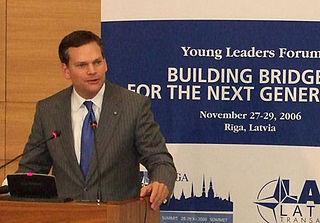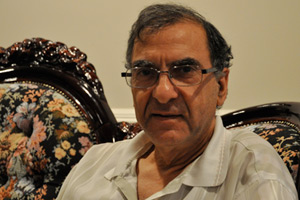The Pakistan lobby in the United States are the professional lobbyists paid directly by the government of Pakistan to lobby the public and government of the United States on behalf of Pakistani interests and/or on behalf of Pakistani American rights and interests. [1]
Stephen Payne is believed to be the preeminent paid lobbyist for the government of Pakistan in the U.S. According to former Pakistani President Pervez Musharraf, Payne played a pivotal role in U.S.-Pakistan relations, serving as Pakistan's lobbyist through a group called Team Eagle (also known as Team Barakat). [2] [3] Payne worked as a lobbyist for Pakistan to deliver a multibillion-dollar U.S. aid package and to remove U.S. economic and military sanctions against Pakistan that had been in place for several years. He also helped Pakistan secure Major non-NATO ally status, which Pakistan received in 2004 as well as helping to secure F-16s, C-130s and military helicopters for Pakistan. [3]
Pakistan has paid lobbyists to obtain “Reconstruction Opportunity Zones,” industrial development zones with the privilege of exporting goods manufactured in Pakistan duty-free to the United States and to maintain high levels of U.S. foreign aid. [4]
Pakistan has sought to furthen its foreign policy interests in the United States through lobbying. In one particular incident in March 1997, the member of the House of Representatives from Indiana Dan Burton was accused of demanding a $5,000 contribution from a Pakistani lobbyist. The lobbyist said that when he was unable to raise the funds, Burton complained to the Pakistani ambassador and threatened to make sure "none of his friends or colleagues" would meet with the lobbyist or his associates. [5]
The lobbying firm Janus-Merritt Strategies led by Iranian-American lawyer David Safavian was also registered by the Pakistani government for lobbying. Safavian was subsequently convicted of a Federal felony in the Jack Abramoff Indian lobbying scandal and served a one-year sentence in Federal prison.
In 2011, the FBI arrested Syed Ghulam Nabi Fai, a U.S. citizen of Kashmiri origin, on charges of secretly lobbying for the Government of Pakistan seeking to influence decisions made in the US regarding the Kashmir conflict, and receiving illegal funding totaling over $4,000,000 from the Inter Services Intelligence agency of the Pakistani Military. Fai's passport has been surrendered to the Court and he is currently under house arrest, with strict security conditions including electronic monitoring via an ankle bracelet. Media reports have revealed that Fai has reportedly confessed, under interrogation, to the charges. He faces a sentence of up to 5 years for this Federal felony.
In response to the crackdown on former Prime Minister Imran Khan, Pakistani-American advocacy groups were mobilizing members of the US Congress to issue statements against human rights abuses in Pakistan, further estranged the bilateral relationship. [6]
In politics, lobbying, or advocacy, is the act of lawfully attempting to influence the actions, policies, or decisions of government officials, most often legislators or members of regulatory agencies, but also judges of the judiciary. Lobbying, which usually involves direct, face-to-face contact in cooperation with support staff that may not meet directly face-to-face, is done by many types of people, associations and organized groups, including individuals on a personal level in their capacity as voters, constituents, or private citizens; it is also practiced by corporations in the private sector serving their own business interests; by non-profits and non-governmental organizations in the voluntary sector through advocacy groups to fulfil their mission such as requesting humanitarian aid or grantmaking; and by fellow legislators or government officials influencing each other through legislative affairs in the public sector. Lobbying or certain practices that share commonalities with lobbying are sometimes referred to as government relations, or government affairs and sometimes legislative relations, or legislative affairs. It is also an industry known by many of the aforementioned names, and has a near complete overlap with the public affairs industry. Lobbyists may be among a legislator's constituencies, for example amateur lobbyists such as a voter or a bloc of voters within their electoral district acting as private citizens; others like professional lobbyists may engage in lobbying as a business or profession; while others are government relations support staff who work on behalf of professional lobbyists but do not actively participate in influencing or meeting face-to-face with targeted personnel enough to be considered registered lobbyists while working in the same professional circles as professional lobbyists who are legally designated as registered lobbyists.

Danny Lee Burton is an American politician who was the U.S. Representative for Indiana's 5th congressional district, and previously the 6th district, serving from 1983 until 2013. He is a member of the Republican Party and was part of the Tea Party Caucus.

Robert Dean Blackwill is a retired American diplomat, author, senior fellow at the Council of Foreign Relations, and lobbyist. Blackwill served as the United States Ambassador to India under President George W. Bush from 2001 to 2003 and as United States National Security Council Deputy for Iraq from 2003 to 2004, where he was a liaison between Paul Bremer and Condoleezza Rice.

Roger Francisco Noriega is an American diplomat who served as Assistant Secretary of State for Western Hemisphere Affairs in the George W. Bush administration He is a visiting fellow at the American Enterprise Institute.

Jack Allan Abramoff is an American lobbyist, businessman, film producer, writer, and convicted felon. He was at the center of an extensive corruption investigation led by Earl Devaney that resulted in his conviction and 21 other people either pleading guilty or being found guilty, including White House officials J. Steven Griles and David Safavian, U.S. Representative Bob Ney, and nine other lobbyists and congressional aides.
The Jack Abramoff Indian lobbying scandal was a United States political scandal exposed in 2005; it related to fraud perpetrated by political lobbyists Jack Abramoff, Ralph E. Reed Jr., Grover Norquist and Michael Scanlon on Native American tribes who were seeking to develop casino gambling on their reservations. The lobbyists charged the tribes an estimated $85 million in fees. Abramoff and Scanlon grossly overbilled their clients, secretly splitting the multi-million dollar profits. In one case, they secretly orchestrated lobbying against their own clients in order to force them to pay for lobbying services.

David Hossein Safavian is an American former lawyer who worked as a congressional aide, lobbyist, and later as a political appointee in the George W. Bush administration. A Republican, he served as Chief of Staff of the United States General Services Administration (GSA). He is a figure in the Jack Abramoff lobbying and corruption scandal, having worked with the lobbyist on the Mississippi Band of Choctaw account. After serving with Abramoff as a lobbyist, in 1997 Safavian co-founded lobbying firm Janus-Merritt Strategies with Republican activist Grover Norquist.

The Foreign Agents Registration Act (FARA) is a United States law that imposes public disclosure obligations on persons representing foreign interests. It requires "foreign agents"—defined as individuals or entities engaged in domestic lobbying or advocacy for foreign governments, organizations, or persons —to register with the Department of Justice (DOJ) and disclose their relationship, activities, and related financial compensation.
Kevin A. Ring is a former American attorney and congressional staffer; he served Republicans in both the House and the Senate, including U.S. Representative John T. Doolittle (R-CA). He also served as a counsel on the Senate Judiciary Committee's Constitution, Federalism and Property Rights Subcommittee.

Robin Lynn Raphel is an American former diplomat, ambassador, CIA analyst, lobbyist, and an expert on Pakistan affairs.

Lobbying in the United States describes paid activity in which special interest groups hire well-connected professional advocates, often lawyers, to argue for specific legislation in decision-making bodies such as the United States Congress. It is often perceived negatively by journalists and the American public; critics consider it to be a form of bribery, influence peddling, and/or extortion. Lobbying is subject to complex rules which, if not followed, can lead to penalties including jail. Lobbying has been interpreted by court rulings as free speech protected by the First Amendment to the U.S. Constitution. Since the 1970s, the numbers of lobbyists and the size of lobbying budgets has grown and become the focus of criticism of American governance.
The Arab lobby in the United States is a collection of formal and informal groups and professional lobbyists in the United States paid directly by Gulf Arab states and private donors on behalf of the Arab states.

The fossil fuels lobby includes paid representatives of corporations involved in the fossil fuel industry, as well as related industries like chemicals, plastics, aviation and other transportation. Because of their wealth and the importance of energy, transport and chemical industries to local, national and international economies, these lobbies have the capacity and money to attempt to have outsized influence on governmental policy. In particular, the lobbies have been known to obstruct policy related to environmental protection, environmental health and climate action.

Stephen Prentiss Payne is an American lobbyist from Houston, Texas. He has also served as a governmental, energy, international affairs, and international business development consultant, corporate and political adviser, foreign diplomat, businessman, fundraiser, and former adviser to two of the United States Department of Homeland Security's Advisory Committees—the Secure Borders and Open Doors Advisory Committee (SBODAC) and the Essential Technology Task Force (ETTF), in connection with which he held a U.S. security clearance.
The Turkish lobby in the United States is a lobby that works on behalf of the Turkish government in promoting that nation's interests with the United States government.
The Egypt lobby in the United States is a collection of lawyers, public relation firms and professional lobbyists paid directly by the government of Egypt to lobby the public and government of the United States on behalf of the interests of the government of Egypt.
The Saudi Arabia lobby in the United States is a collection of lawyers, public relation firms and professional lobbyists paid directly by the government of Saudi Arabia to lobby the public and government of the United States on behalf of the interests of the government of Saudi Arabia.

Syed Ghulam Nabi Fai is an American citizen of Kashmiri origin, and a Jamaat-e-Islami activist. He founded the organisation Kashmiri American Council in the United States and carried out lobbying on behalf of Kashmiri separatist groups and the Government of Pakistan. In 2011, the US government stated that this was a front group for Pakistan's Inter-Services Intelligence (ISI).
Zaheer Ahmad was a Pakistani American medical doctor who was credited as being the founder and chief executive of the Shifa International Hospital in Islamabad. In 2011, he came under media attention when the United States accused him of being an associate of Dr. Syed Ghulam Nabi Fai, a lobbyist from Kashmir and founder of the Kashmir American Council (KAC) who was charged for covertly attempting to lobby and influence the American government on the Kashmir conflict on behalf of the Government of Pakistan's interests.
George Aref Nader is a Lebanese-American consultant, lobbyist, political adviser, and repeat sex offender. He has repeatedly acted as an unofficial liaison between United States politicians and the United Arab Emirates and Saudi Arabia and as a lobbyist for private security firm Blackwater.